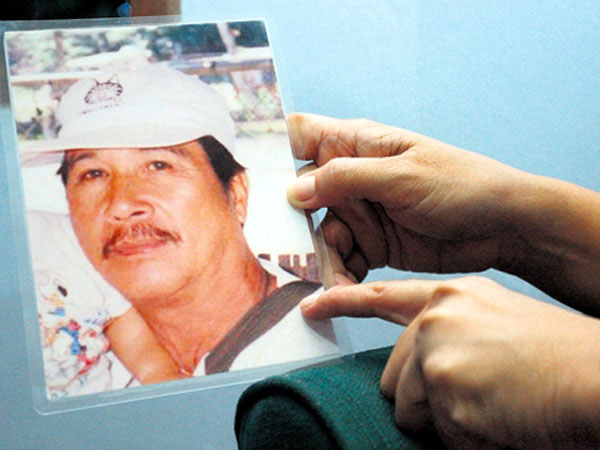
Reynafe Momay-Castillo points to a picture of her father, Reynaldo Momay, a photographer for Midland Review. JEOFFREY MAITEM / INQUIRER MINDANAO
MANILA, Philippines–The quest for justice for the death of Midland Review photojournalist Reynaldo “Bebot” Momay will continue at the Court of Appeals.
Momay is the 58th victim in the gruesome Nov. 23, 2009 Maguindanao massacre where, aside from him, claimed the lives of 31 other journalists.
However, the case against Datu Andal Ampatuan Jr. and 100 other accused has been dismissed by the Quezon City Regional Trial Court Branch 221 because “mere allegation and speculation is not evidence, and is not equivalent to proof.”
Momay’s body was never found. Only an identification card was found at the murder scene. The murder case for his death was filed only in 2012 after dentures that were recovered from the mass grave were confirmed to be his.
On Friday, Momay’s family through his lawyers have filed a notice of appeal before the QCRTC signifying their intent to take the case to the Court of Appeals instead of filing a motion for reconsideration.
“Private complainant [victim’s family] through counsel and unto this Honorable Court hereby give notice that they are appealing to the Honorable Court of Appeals both the criminal and civil aspect of the case,” read their notice.
Aware of jurisprudence treating an appeal from acquittal as a violation of the doctrine against double jeopardy, Momay’s family said the Supreme Court should revisit and reverse the doctrine “due to unconstitutional applicability in the Philippines.”
Double jeopardy means that an accused cannot be tried for the same offense twice.
“The doctrine was an imposition of the United States of America as a colonial power on the occupied Philippine islands in 1904,” read the notice citing the case of American lawyer Thomas Kepner when the US Supreme Court overruled the Philippine Supreme Court ruling that convicted Kepner.
“The imposition of said doctrine in the Philippines and its continuing use in the country – even after the Philippines gained independence and had its own sovereign constitution – violates the constitutional provisions and equal protection and due process,” they added.